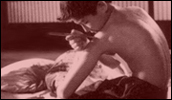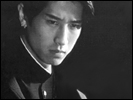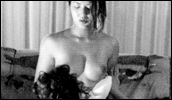Fudoh: The New Generation
- Year
- 1996
- Original title
- Gokudo Sengokushi Fudo
- Japanese title
- 極道戦国志 不動
- Director
- Cast
- Running time
- 99 minutes
- Published
- 15 May 2001



by Tom Mes
Before Takashi Miike explosive emergence on the international cinema scene with Audition at the dawn of the millennium, his 1996 production Fudoh: The New Generation had been doing the rounds of film festivals for quite a while, gaining itself a fervent fan following along the way. Little wonder, since this celebration of excess will leave few souls untouched. Be it in a good or bad way.
Set on the island of Kyushu, it tells the story of successful high school student Riki Fudoh, who leads a double life in organised crime. With his gang of underage assassins (forerunners of the kiddie killers in Dead or Alive 2 (2000), including five-year olds with hand guns and a teenage stripper shooting deadly darts from her vagina) he not only controls the goings-on at his school, but aspires to take over criminal affairs on the entire island. Fudoh's true motivations are not just a lust for power. An extensive flashback at the film's opening shows how as a child he witnessed the grisly murder of his older brother at the hands of his yakuza boss father and his subsequent wish for revenge. From this Shakespearean premise flow forth buckets of blood as Riki and the kids commence an assassination campaign against the top figures of the local underworld, with the pater familias as the ultimate target. The crime world goes into a state of panic and calls in mysterious and powerful problem solver Nohma (a mulleted Riki Takeuchi looking every inch the comic book tough guy). Riki's father meanwhile sends out his own weapon in the shape of a former government agent, who goes undercover as the high school gym teacher and uses methods even more violent than those of young Fudoh's minions.
Based on a manga series, Fudoh's unflinching approach is not without basis or precedent. In fact, it is very much in tune with its origins and cultural roots, in manga but also in cinema. The term 'comic book movie' is often used for derision, but this attitude, born of cultural elitism, brushes over the centuries old legacy of the Japanese manga, which is as culturally valid as the jidai geki genre. Not entirely unlike George Romero's tribute to American 1950s horror comics with Creepshow, Fudoh follows manga's stylistic (in terms of for instance composition, framing and costume design) and narrative trademarks quite closely, and adds to that a strongly developed generational gap theme, foreshadowing Kinji Fukasaku's Battle Royale, made four years later. In Fudoh as in Fukasaku's film we find the youth-gone-wild theme that has been a staple of Japanese cinema since the emergence of the taiyozoku films of the late 1950s. Like many of those films, Fudoh sides with the young and bears a sense of distrust in the behaviour of the old.
Director of photography Hideo Yamamoto (a Miike regular who worked on Bird People in China, Blues Harp, and Dead or Alive, to name a few) gives the film a striking clarity in lighting, a very effective counter point to the garish colour that floods the film's numerous action sequences.
Fudoh is deliriously violent and packed with the kind of outrageous, transgressive details (hermaphrodite sex, anyone?) that have become Miike's trademark. It's the kind of film that has 'guilty pleasure' written all over it. In 5-foot high neon letters. It is, however, another testament to the talent of Takashi Miike that Fudoh is thematically provocative and thoroughly inspired at the same time.
As might be guessed from the film's very open-ended finale, the struggle between Riki Fudoh and Nohma would continue in two decidedly inferior sequels, Fudoh II - Nohma Strikes Back! and Fudoh III - Revenge of Fudoh, both from 1997 and directed by Yoshiho Fukuoka.